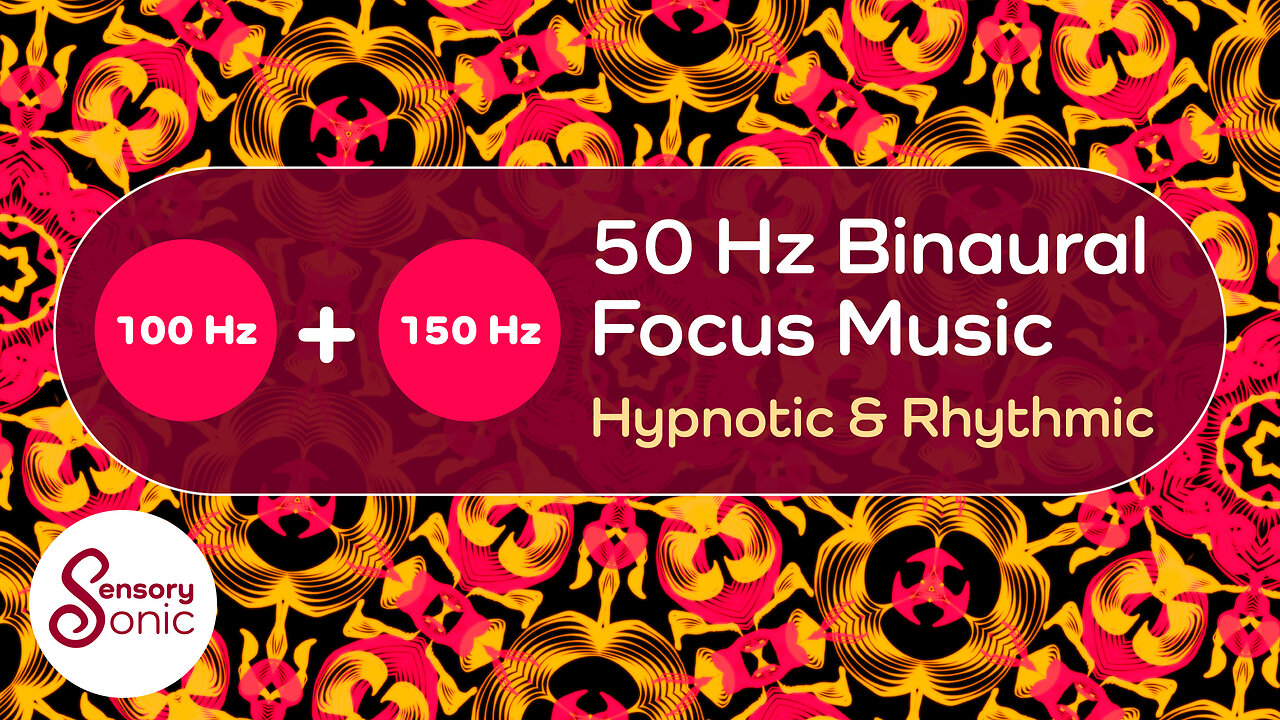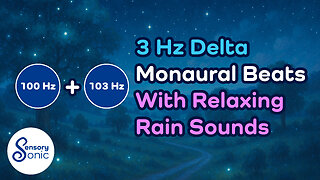Premium Only Content

50 Hz Gamma Binaural Focus Music | Tune Out Distractions | Hypnotic & Rhythmic | Help ADHD
I've blended pulses of 50 Hz (100 Hz +150 Hz) gamma binaural beats with rhythmic music to create an hour-long hypnotic soundtrack perfect for tuning out distractions when you wish to focus. The gamma wave frequencies enhance your ability to concentrate and may help to combat ADHD symptoms.
#brainwaveentrainment #adhd #focusmusic #focusmusicforstudying #focusmusicforwork #binauralbeats #binaural #50hz #studymusic #gamma #gammawaves #concentration
---
Binaural beats are a form of auditory illusion created by playing a slightly different frequency in each ear using headphones. When the brain processes these two frequencies, it perceives a third tone, known as the binaural beat, which has a frequency equal to the difference between the two input frequencies. This perceived beat is not actually present in the external environment but is a creation of the brain's processing.
The underlying principle behind binaural beats is called "brainwave entrainment." It suggests that the brain's electrical activity can be synchronized or entrained to external rhythmic stimuli, such as sound frequencies. Various frequencies of binaural beats correspond to different mental states, ranging from relaxation to focus and even deep meditation.
The benefits of binaural beats can vary from person to person. Some potential benefits reported by individuals include:
Relaxation and stress reduction: Binaural beats in the lower frequency range, such as delta (0.5-4 Hz) and theta (4-8 Hz), are associated with deep relaxation and can help reduce stress and anxiety.
Improved focus and concentration: Binaural beats in the alpha (8-13 Hz) and beta (13-30 Hz) ranges may enhance alertness, concentration, and cognitive performance. They may help with studying or for tasks requiring mental focus.
Sleep enhancement: Binaural beats in the delta range can promote sleep and reduce insomnia by helping to induce a state of deep relaxation and facilitating the transition into sleep.
Mood enhancement: Binaural beats may have mood-altering effects, promoting positivity, tranquility, or even euphoria.
It's important to note that scientific research on the effectiveness of binaural beats still needs to be expanded. While some studies suggest positive effects, the individual response to binaural beats can also vary, and some people may be more receptive than others.
Binaural beats are generally considered safe for most individuals when used correctly. However, there are a few considerations:
Potential discomfort: Some individuals may find certain frequencies or volume levels of binaural beats uncomfortable or irritating. Always listen at a comfortable volume.
Epilepsy and seizures: People with a history of epilepsy or seizures should exercise caution, as flashing lights or rapid auditory stimuli can trigger seizures in sensitive individuals.
Dizziness or lightheadedness: Occasionally, binaural beats may induce mild dizziness or lightheadedness in some individuals.
Remember that binaural beats should not replace medical treatment or professional advice for any health condition.
-
 8:01:35
8:01:35
Sensory Sonic
3 months ago3 Hz Delta Monaural Beats With Rain Sounds – 8 hours, Deep Sleep, Healing | No headphones needed
3511 -
 LIVE
LIVE
The Quartering
3 hours agoOn To The Big Bosses! Act 2 Of Expedition 33
805 watching -
 1:24:56
1:24:56
Glenn Greenwald
7 hours agoGlenn Takes Your Questions on Tulsi's Russiagate Revelations, Columbia's $200M Settlement, and More | SYSTEM UPDATE #492
106K52 -
 2:11:56
2:11:56
megimu32
3 hours agoOTS: With Great Power: Every Spider-Man Movie Unmasked w/ @thisistheraygaming
14.4K3 -
 2:38:48
2:38:48
WickedVirtue
2 hours agoSailing w/ The Crew
16.2K -
 4:29:37
4:29:37
Meisters of Madness
5 hours agoThe Finals with Redd
18.5K1 -
 1:27:11
1:27:11
Omar Elattar
10 hours agoThe Dating Expert: "I've Helped 4,000 Men Find LOVE!" - The #1 Alpha Trait Women Secretly Crave!
31.9K -
 LIVE
LIVE
VOPUSARADIO
10 hours agoPOLITI-SHOCK! "END THE FED, END THE LIES & END THE DEEP STATE ONCE AND FOR ALL"!
230 watching -
 1:43:38
1:43:38
LumpyPotatoX2
6 hours agoRumble Creator Round-Table - Let's Talk About It
27.1K2 -
 32:38
32:38
The Mel K Show
8 hours agoMel K & Dr. James Thorp, MD | Sacrifice: The Targeting of the Most Vulnerable | 7-24-25
31.6K12